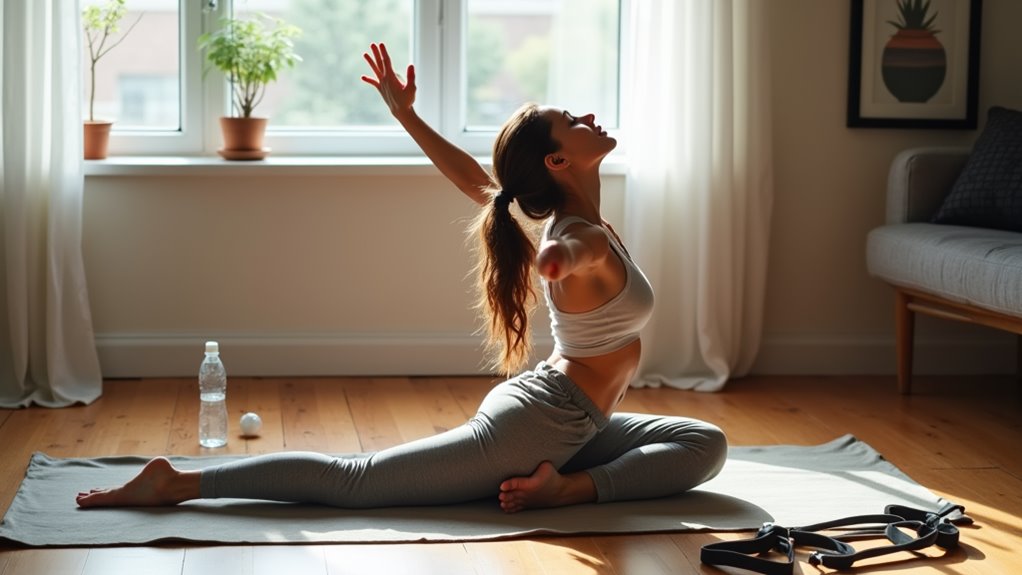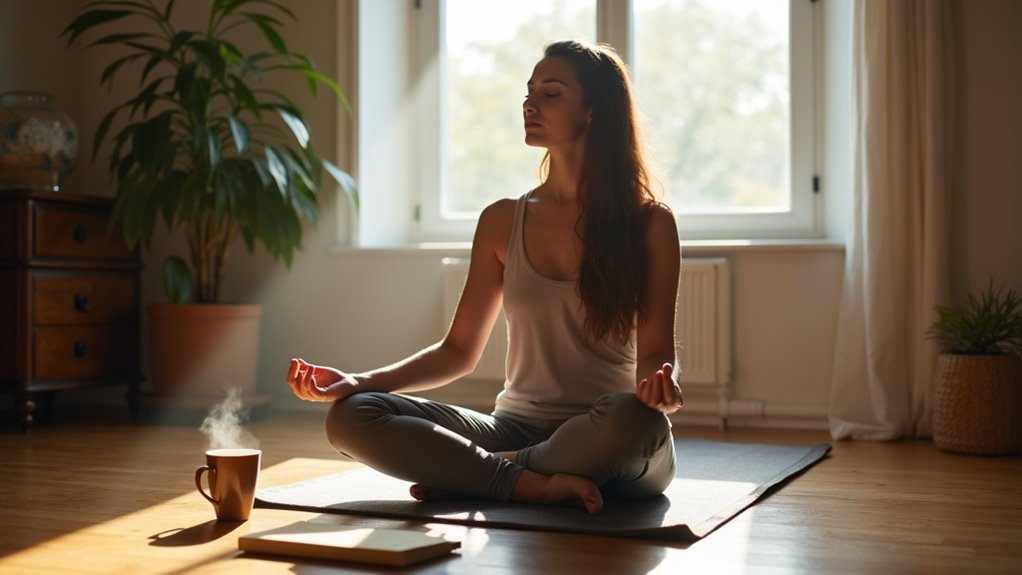You don't need an expensive wellness routine to transform your wellbeing. Start with simple, free activities like daily walks, bodyweight exercises, or online workout videos. Create a spa-like atmosphere at home using DIY beauty treatments from kitchen ingredients like honey and avocado. Spend time in nature, practice mindful moments, and connect with your community through free local events and groups. Transform your bathroom into a relaxation zone with dimmed lights and soothing baths using basic ingredients. Your journey to improved wellbeing can begin with these accessible, budget-friendly practices that deliver powerful results.
Key Takeaways
- Transform everyday activities into wellness moments by doing squats while brushing teeth or taking stairs instead of elevators.
- Create home spa experiences using kitchen ingredients like honey masks and coconut oil for affordable beauty treatments.
- Access free workout videos on YouTube and start with just 10 minutes of daily movement to build a sustainable routine.
- Take advantage of nature's free stress relief through park walks, forest bathing, or growing indoor herbs.
- Join free community activities through local libraries, parks, and online platforms to enhance social connections and mental wellbeing.
Daily Movement and Exercise

Although many people think of exercise as expensive gym memberships or fancy equipment, moving your body doesn't have to cost anything.
You can incorporate simple movements into your daily routine by taking walks around your neighborhood, doing bodyweight exercises at home, or dancing to your favorite music.
Start with just 10 minutes daily and gradually increase your activity level.
Try squats while brushing your teeth, stretch during TV commercials, or take the stairs instead of the elevator.
You'll find endless free workout videos on YouTube that cater to all fitness levels and preferences.
If you're new to exercise, begin with gentle activities like walking or basic stretching.
Mindful Home Spa Rituals
Who says you need an expensive spa membership to pamper yourself?
You can create luxurious spa experiences right at home with items you likely already have. Transform your bathroom into a sanctuary by dimming the lights and using candles you've collected over time.
Draw a warm bath and add Epsom salts or a few drops of essential oils. While soaking, apply a DIY face mask made from kitchen ingredients like honey, yogurt, or mashed avocado.
Wrap yourself in your softest towel and moisturize with coconut oil or your regular lotion. Don't forget to play calming music or nature sounds from your phone or computer.
These simple rituals can help you unwind, reduce stress, and practice self-care without spending much money.
Nature-Based Stress Relief

While home spa treatments offer wonderful relaxation, nature provides an equally powerful and completely free way to destress. You can start by taking a 15-minute walk in your local park, focusing on the rustling leaves, birdsong, and fresh air.
Even sitting quietly in your backyard or on a balcony can help you reconnect with the natural world.
Try earthing – the practice of walking barefoot on grass, sand, or soil – which may reduce stress and improve sleep.
Forest bathing, or simply spending time among trees, can lower cortisol levels and blood pressure.
During winter months, you can bring nature indoors by growing herbs on your windowsill or creating a small succulent garden.
These simple practices cost nothing but offer significant benefits for your mental wellbeing.
Kitchen Wellness Hacks
Your kitchen holds a treasure trove of natural ingredients for creating effective DIY beauty treatments, from honey face masks to coconut oil hair conditioners.
You'll find that common pantry items like oatmeal, yogurt, and fresh herbs can transform your self-care routine without breaking the bank.
DIY Beauty Treatments
Three common kitchen ingredients can transform into powerful beauty treatments without breaking the bank.
Mix raw honey with a dash of cinnamon for a natural face mask that fights acne and brightens skin. Leave it on for 15 minutes before rinsing with warm water.
For dry, damaged hair, mash a ripe avocado with olive oil to create a deep conditioning treatment. Apply it to damp hair, cover with a shower cap, and rinse after 20 minutes.
Your morning coffee grounds can double as an invigorating body scrub when combined with coconut oil. The caffeine helps reduce the appearance of cellulite while the grounds exfoliate dead skin cells.
Gently massage the mixture in circular motions, then rinse thoroughly. Store any leftover scrub in an airtight container for up to one week.
Budget Pantry Therapy
Instead of spending money on expensive stress-relief products, you can create calming remedies from everyday pantry items.
Mix honey with warm milk for a natural sleep aid, or brew a soothing chamomile tea with a dash of cinnamon.
Create an energizing drink by combining lemon, ginger, and hot water.
Your pantry's aromatherapy potential is vast.
Vanilla extract can ease anxiety when you add a few drops to your wrists, while brewing coffee beans fills your space with an uplifting scent.
You'll find that common spices like nutmeg and cardamom can enhance your mood when added to baked goods or warm drinks.
For muscle tension, make a warm compress using rice in a clean sock, heated in the microwave.
Free Mental Health Resources

While professional therapy can be expensive, numerous free mental health resources are available to support your wellbeing.
You'll find evidence-based apps like Wysa and Mindshift that offer guided meditation, anxiety management, and mood tracking. Many universities and organizations provide free online courses about mental health through platforms like Coursera and edX.
Local libraries often host support groups and wellness workshops at no cost.
You can also access 24/7 crisis hotlines and text services when you need immediate support.
The National Alliance on Mental Illness (NAMI) offers free educational resources and peer support groups in many communities.
Don't overlook social media accounts run by licensed therapists, which regularly share coping strategies and mental health tips.
Creative Expression at Home
Engaging in creative activities at home can become a powerful outlet for processing emotions and reducing stress. You don't need expensive supplies or formal training to express yourself creatively. Start with basic materials like paper and pencils for drawing, journaling, or poetry writing.
Transform everyday items into art by collaging magazine cutouts or creating sculptures from recyclables. Try dancing freely to your favorite music, singing in the shower, or using your smartphone to photograph interesting patterns in your living space.
If you enjoy words, write short stories or start a blog about your experiences. Remember that creative expression isn't about perfection – it's about the process of making something that feels meaningful to you. Let your imagination guide you without judgment or pressure.
Social Connection Without Cost

You don't need to spend money to maintain meaningful social connections in your life.
Consider starting a virtual game night group with friends, finding a walking buddy in your neighborhood, or joining free community meet-ups in your area.
These cost-free social activities can help you build and strengthen relationships while supporting your mental well-being.
Virtual Game Night Groups
Although in-person gatherings can strain budgets, virtual game nights offer a free way to maintain social connections with friends and family. You'll find countless multiplayer games that don't require purchases, from classic card games to modern party games through platforms like Jackbox or Among Us.
To start your virtual game night, choose a video chat service like Zoom, Discord, or Google Meet. Then, select games that work well in an online format – trivia, charades, or word games are excellent choices.
You can even recreate board game experiences using free online alternatives. Schedule regular meetups to keep the momentum going, and rotate who chooses the games to maintain variety.
You'll discover that these digital gatherings can be just as engaging and meaningful as traditional get-togethers.
Neighborhood Walking Buddies
One of the simplest ways to blend exercise with social connection is finding a neighborhood walking buddy. You can start by asking friends who live nearby or joining local social media groups to find like-minded neighbors interested in regular walks.
Having a walking partner helps you stay accountable while turning exercise into an enjoyable social activity. Set a consistent schedule that works for both of you, whether it's morning walks before work or evening strolls after dinner.
You'll discover new routes through your neighborhood, share meaningful conversations, and build a stronger sense of community. As an added benefit, walking with someone else increases safety and motivation, especially during darker hours or when you're feeling less energetic.
Free Community Meet-ups
While many people assume socializing requires spending money, numerous free community meet-ups exist in nearly every town and city. You'll find book clubs at local libraries, running groups that gather in parks, and meditation circles that welcome newcomers.
Many community centers host game nights, crafting sessions, and discussion groups at no cost.
To discover these gatherings, check your library's bulletin board, search social media platforms, or visit websites like Meetup.com. You can also explore neighborhood apps that connect local residents.
Don't overlook religious organizations, which often welcome everyone to their social events regardless of faith.
Remember that these meet-ups offer more than just free entertainment – they're opportunities to build meaningful connections with people who share your interests and live in your community.
Frequently Asked Questions
How Can I Maintain Self-Care Habits When Working Irregular Shift Patterns?
When working irregular shifts, you'll need to create flexible routines that adapt to your changing schedule.
Keep a small self-care kit at work, plan meals ahead, and set consistent sleep hours even when your shifts change.
Use your phone to schedule brief meditation breaks, stretching exercises, or quick journaling sessions.
Don't skip basic habits like hydration and healthy snacks, regardless of what time you're working.
What Role Does Decluttering Play in Mental Wellness and Self-Care?
Like clearing storm clouds from a troubled sky, decluttering your space directly impacts your mental clarity.
When you remove physical chaos, you'll reduce mental stress and create room for peace.
Decluttering helps you feel more in control, improves focus, and makes daily tasks easier.
You'll find that organizing your environment leads to better sleep, reduced anxiety, and a stronger sense of calm in your daily life.
Can Spiritual Practices Be Incorporated Into Budget-Friendly Self-Care Routines?
You can easily integrate spiritual practices into your self-care routine without spending money.
Try meditation, mindful breathing, or prayer in a quiet space at home. Create a personal altar using items from nature, write in a gratitude journal, or practice yoga using free online videos.
Connect with like-minded people through community groups, or take contemplative walks outdoors to nurture your spiritual wellbeing.
How Do Seasonal Changes Affect Self-Care Practices and Mental Wellbeing?
As the seasons dance through their yearly waltz, you'll notice your mood and energy levels shift alongside nature's rhythm.
Shorter winter days can dampen your spirits and increase fatigue, while spring's arrival often boosts motivation.
You'll need to adjust your self-care routine accordingly – embracing cozy indoor activities during cold months and outdoor exercises when it's warm.
Listen to your body's changing needs throughout the year.
What Are Effective Self-Care Strategies for Caregivers With Limited Time?
When you're caring for others, you'll need quick, effective self-care moments.
Try "micro-breaks" – take five deep breaths between tasks, stretch during phone calls, or meditate while waiting in lines.
Schedule small pockets of "me time" during naps or early mornings.
Set boundaries by saying no to non-essential commitments.
Use technology for support – join online caregiver groups or try stress-relief apps during downtimes.
Conclusion
Remember that "a penny saved is a penny earned" applies to your wellbeing too. You don't need expensive wellness programs or fancy spa treatments to take care of yourself. By incorporating these budget-friendly self-care practices into your daily routine, you're investing in your physical and mental health without breaking the bank. Start small, stay consistent, and watch how these simple habits transform your quality of life.

Leave a Reply